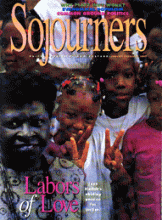The embrace of free-market, conservative politics by large numbers of evangelicals has so substantially altered the American political landscape in recent years that many people have come to conclude that it has always been so. Certainly it is tempting to point to the cozy relationships that many evangelicals have established with the wealthy and powerful, and read this relationship backward into history.
Yet such conjectures proceed on thin historical ice. Beneath the veneer of a monolithically conservative reading of the evangelical past lies a different kind of story. From the Second Great Awakening through the Gilded Age and well into our own day, evangelicalism has also nurtured a throbbing kind of revivalist populism, one that delivered both Christ's blessing to the poor and his angry rebukes to their wealthy exploiters. While this evangelical populism has been seduced in recent years by determined political forces, its appeal and power still linger.
In the years before the Civil War, so powerfully did revivals sweep through American society that historians commonly refer to the era as the great age of Democratic Evangelicalism. Some scholars have stressed how this new religious impulse strengthened the hands of economic elites, who discovered in it a useful new means by which to socialize and discipline an unruly working class.
Beyond the market centers, however, evangelicalism took on different tones, colored more by Jeffersonian precepts and the rich brew of radical egalitarianism left over from the American revolution. As shaped by full-throated preachers such as traveling Methodist revivalists Francis Asbury and "Crazy" Lorenzo Dow, and early Baptist leader John Leland and Disciples of Christ founder Elias Smith, an evangelicalism emerged that proved less comforting to pious, middle-class entrepreneurs.
Read the Full Article

